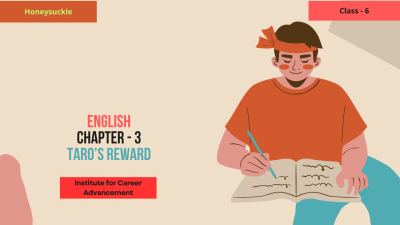Course description
"Taro's Reward" is a popular story often included in Class 6 English textbooks, typically as part of the Moral Stories section. The story, set in Japan, conveys valuable lessons about kindness, selflessness, and the rewards of doing good deeds. Here's an overview of the course content for this story:
Story Overview:
"Taro's Reward" is about a young, poor woodcutter named Taro who lives in a small village with his elderly parents. One cold winter day, Taro finds a magical waterfall that grants a wish. He drinks from it and is rewarded with a gift of wine that he takes home to his parents. His parents are thrilled by the gift, and Taro’s act of kindness spreads throughout the village. However, when the villagers try to copy Taro’s actions, they are punished by receiving water instead of wine. The story shows that genuine selflessness and good intentions are rewarded, while selfishness and greed are punished.
Key Themes:
Kindness and Selflessness:
The central theme of the story is selflessness and helping others without expecting any rewards. Taro’s love and care for his parents are the driving forces behind his actions.
The Reward of Good Deeds:
The story highlights the idea that good deeds done out of kindness and love are often rewarded in unexpected ways. Taro’s generosity is rewarded with a special gift, reinforcing the idea that doing good for others brings happiness and rewards.
Greed vs. Generosity:
The villagers, motivated by greed, try to take advantage of the waterfall’s magic, but they are punished, showing that selfishness does not lead to good outcomes. This contrasts with Taro’s generous, selfless actions.
Connection with Nature:
The magical waterfall represents a connection with nature, where goodness and purity are reciprocated. The natural world rewards those with pure hearts, while those with selfish intentions are punished.
Skills Developed:
Reading Comprehension: Students will better understand how to summarize the story, identify key events, and understand character motivations.
Critical Thinking: They will think critically about the moral lessons of the story and how they can apply these lessons in their own lives.
Vocabulary Building: Students will develop their vocabulary by learning new words related to the story.
Creative Writing: Writing about their own experiences or imagining alternate endings will encourage creativity and writing skills.
Speaking and Listening: Group discussions and role-playing activities will help improve communication skills.
Key Vocabulary and Concepts:
Selflessness: Putting the needs of others before your own.
Generosity: The quality of being willing to give to others without expecting anything in return.
Greed: An excessive desire for something, often leading to negative consequences.
Reward: A return for something good or deserving that has been done.
Magical (Waterfall): Something out of the ordinary, often supernatural or enchanted, representing nature’s response to good actions.
Kindness: The quality of being friendly, caring, and considerate.
Conclusion:
By the end of the lesson, students should have a deep understanding of the story's moral lessons on kindness, selflessness, and the importance of doing good deeds without expecting rewards. The story encourages students to reflect on their own actions and how they can make a positive impact by being kind to others.
"তারো 'স রিওয়ার্ড" একটি জনপ্রিয় গল্প যা প্রায়শই ষষ্ঠ শ্রেণির ইংরেজি পাঠ্যপুস্তকে অন্তর্ভুক্ত করা হয়, সাধারণত নৈতিক গল্প বিভাগের অংশ হিসাবে। জাপানের প্রেক্ষাপটে নির্মিত এই গল্পটি দয়া, নিঃস্বার্থতা এবং ভাল কাজ করার পুরস্কার সম্পর্কে মূল্যবান শিক্ষা প্রদান করে। এই গল্পের জন্য কোর্সের বিষয়বস্তুর একটি সংক্ষিপ্ত বিবরণ এখানে দেওয়া হলঃ
গল্পের সারসংক্ষেপঃ "তারো 'স রিওয়ার্ড" তারো নামে এক তরুণ, দরিদ্র কাঠমিস্ত্রির গল্প, যে তার বৃদ্ধ বাবা-মায়ের সঙ্গে একটি ছোট গ্রামে থাকে। শীতের এক ঠাণ্ডা দিনে, তারো একটি যাদুকরী জলপ্রপাত খুঁজে পায় যা একটি ইচ্ছা পূরণ করে। সে এটি থেকে পান করে এবং তাকে একটি উপহার ওয়াইন দিয়ে পুরস্কৃত করা হয় যা সে তার বাবা-মায়ের কাছে বাড়িতে নিয়ে যায়। তার বাবা-মা উপহারটি দেখে রোমাঞ্চিত হয় এবং তারোর সদয় আচরণ সারা গ্রামে ছড়িয়ে পড়ে। যাইহোক, গ্রামবাসীরা যখন তারোর কাজ নকল করার চেষ্টা করে, তখন তাদের মদের পরিবর্তে জল দিয়ে শাস্তি দেওয়া হয়। গল্পটি দেখায় যে প্রকৃত নিঃস্বার্থতা এবং ভাল উদ্দেশ্যকে পুরস্কৃত করা হয়, অন্যদিকে স্বার্থপরতা এবং লোভকে শাস্তি দেওয়া হয়।
মূল বিষয়বস্তুঃ দয়া ও নিঃস্বার্থতাঃ
গল্পের কেন্দ্রীয় বিষয়বস্তু হল নিঃস্বার্থতা এবং কোনও পুরস্কারের আশা না করে অন্যকে সাহায্য করা। তার বাবা-মায়ের প্রতি তার ভালবাসা এবং যত্ন তার কর্মের পিছনে চালিকা শক্তি।
সৎকর্মের পুরস্কারঃ
গল্পটি এই ধারণাকে তুলে ধরে যে দয়া ও ভালবাসার কারণে করা ভাল কাজগুলি প্রায়শই অপ্রত্যাশিত উপায়ে পুরস্কৃত হয়। তারোর উদারতাকে একটি বিশেষ উপহার দিয়ে পুরস্কৃত করা হয়, যা এই ধারণাকে শক্তিশালী করে যে অন্যদের জন্য ভাল করা সুখ এবং পুরস্কার নিয়ে আসে।
লোভ বনাম। উদারতাঃ
গ্রামবাসীরা, লোভ দ্বারা অনুপ্রাণিত হয়ে, জলপ্রপাতের জাদুর সুযোগ নেওয়ার চেষ্টা করে, কিন্তু তাদের শাস্তি দেওয়া হয়, যা দেখায় যে স্বার্থপরতা ভাল ফলাফলের দিকে পরিচালিত করে না। এটি তারোর উদার, নিঃস্বার্থ কাজের সাথে বৈপরীত্য দেখায়।
প্রকৃতির সঙ্গে সম্পর্কঃ
ঐন্দ্রজালিক জলপ্রপাতটি প্রকৃতির সঙ্গে একটি সংযোগের প্রতিনিধিত্ব করে, যেখানে মঙ্গল এবং বিশুদ্ধতা পারস্পরিকভাবে প্রতিফলিত হয়। প্রাকৃতিক জগৎ শুদ্ধ হৃদয়ের লোকদের পুরস্কৃত করে, অন্যদিকে স্বার্থপর উদ্দেশ্যের লোকদের শাস্তি দেওয়া হয়।
বিকশিত দক্ষতাঃ
বোধগম্যতা পড়াঃ শিক্ষার্থীরা আরও ভালভাবে বুঝতে পারবে কিভাবে গল্পের সংক্ষিপ্তসার করতে হয়, মূল ঘটনাগুলি চিহ্নিত করতে হয় এবং চরিত্রের অনুপ্রেরণা বুঝতে হয়।
সমালোচনামূলক চিন্তাভাবনাঃ তারা গল্পের নৈতিক পাঠ এবং কীভাবে তারা এই পাঠগুলি তাদের নিজের জীবনে প্রয়োগ করতে পারে সে সম্পর্কে সমালোচনামূলকভাবে চিন্তা করবে।
শব্দভান্ডার নির্মাণঃ শিক্ষার্থীরা গল্প সম্পর্কিত নতুন শব্দ শেখার মাধ্যমে তাদের শব্দভাণ্ডার বিকাশ করবে।
সৃজনশীল লেখাঃ তাদের নিজস্ব অভিজ্ঞতা সম্পর্কে লেখা বা বিকল্প সমাপ্তি কল্পনা করা সৃজনশীলতা এবং লেখার দক্ষতাকে উৎসাহিত করবে।
কথা বলা এবং শোনাঃ দলগত আলোচনা এবং ভূমিকা পালনের ক্রিয়াকলাপ যোগাযোগের দক্ষতা উন্নত করতে সহায়তা করবে।
মূল শব্দভান্ডার ও ধারণাঃ
নিঃস্বার্থতাঃ নিজের প্রয়োজনের আগে অন্যের প্রয়োজনকে তুলে ধরা।
উদারতাঃ বিনিময়ে কিছু আশা না করে অন্যকে দিতে ইচ্ছুক হওয়ার গুণ।
লোভঃ কোনও কিছুর জন্য অতিরিক্ত আকাঙ্ক্ষা, যা প্রায়শই নেতিবাচক পরিণতির দিকে পরিচালিত করে।
পুরষ্কারঃ ভাল বা যোগ্য কিছু করার জন্য একটি ফেরত।
জাদুকরী (জলপ্রপাত) সাধারণের বাইরে কিছু, প্রায়শই অতিপ্রাকৃত বা মন্ত্রমুগ্ধ, যা ভাল কাজের প্রতি প্রকৃতির প্রতিক্রিয়ার প্রতিনিধিত্ব করে।
দয়াঃ বন্ধুত্বপূর্ণ, যত্নশীল এবং বিবেচক হওয়ার গুণ।
উপসংহারঃ পাঠের শেষে, শিক্ষার্থীদের দয়া, নিঃস্বার্থতা এবং পুরস্কারের প্রত্যাশা না করে ভাল কাজ করার গুরুত্ব সম্পর্কে গল্পের নৈতিক পাঠ সম্পর্কে গভীর ধারণা থাকা উচিত। গল্পটি শিক্ষার্থীদের তাদের নিজস্ব ক্রিয়াকলাপ এবং কীভাবে তারা অন্যদের প্রতি সদয় হয়ে ইতিবাচক প্রভাব ফেলতে পারে তা প্রতিফলিত করতে উৎসাহিত করে।













